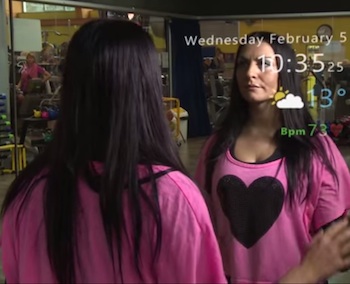 A European consortium of 11 research institutions, called Semeoticons, has developed a health-sensing mirror called Wize Mirror, which evaluates of facial signs related to cardiovascular and metabolic risk, and encourages users, based on this data, to reduce their health risk through lifestyle improvements, according to Histalk.
A European consortium of 11 research institutions, called Semeoticons, has developed a health-sensing mirror called Wize Mirror, which evaluates of facial signs related to cardiovascular and metabolic risk, and encourages users, based on this data, to reduce their health risk through lifestyle improvements, according to Histalk.
A paper about the Wize Mirror was published in Biosystems and Engineering last month.
Tracking physical and expressive features in the face, researchers explain, is a good indicator of individual’s well-being. Wize Mirror uses contactless sensors, like 3D optical sensors, a multispectral camera, gas detection sensors, and microphones, to conduct the analysis of people's faces. The gas detection sensors will be used to monitor the user's breath, which will collect data on how much a user drinks and smokes.
Data collected from Wize is processed to extract biometric and compositional descriptors from images of the user's face. From there, Wize will create a “wellness index” for users.
Wize will monitor the evolution of a user's health over time and provide suggestions as well coaching messages to help the user improve their health. People will be able to share data they collect from Wize with health professionals so that they can receive, when needed, direct guidance and support.
The mirror will be designed for use in the user's home as well as fitness and nutritional centers, pharmacies, and schools.
The health-sensing mirror is not a new concept. In late 2009, MIT graduate student Ming-Zher Poh developed a similar health sensing mirror that tracks several health metrics including pulse, respiration, oxygen saturation, and blood-pressure. Poh went on to apply this technology to software and launched Cardiio, which now offers a heart rate tracking app.


















